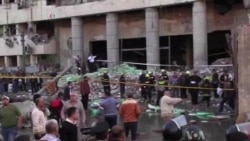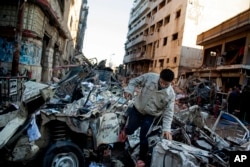CAIRO —
The jihadis of Egypt's Ansar Beit al Maqdis have been called the world's most frustrated terrorists. Time after time, the Sinai-based militants have claimed responsibility for attacks, only to have Egypt's government blame the Muslim Brotherhood.
Since the ouster of President Mohamed Morsi last year and the crackdown on his Muslim Brotherhood, Egypt's military-backed interim government has been waging a war on terror, and it has been anything but precise.
The military has stepped up operations in Sinai. Jihadists have been targeted and killed. Thousands of Muslim Brothers are in prison.
Jailed, too, are students who took part in unauthorized protests, along with journalists who met with Brotherhood members. Even a journalist who met with a journalist who met with MB members is implicated in a terror plot. They are joined by academics, secular activists and an untold number of others caught up in the campaign.
All of which can obscure the fact there are, by any classic definition, bona fide terrorists on Egyptian soil.
ABM
Al-Qaida-inspired Ansar Beit al Maqdis, or Supporters of Jerusalem, was formed in 2011, in the security breakdown that followed the Arab Spring. It has launched missiles into Israel, but it saves its special wrath for Egypt's security forces.
ABM stepped up attacks after Morsi's fall, claiming hundreds of lives, from fresh-faced conscripts patrolling the largely lawless Sinai Peninsula, to military officers gunned down in the capital.
The jihadists appear to have easy access to arms that have been washing over the region from the unsecured caches of Libya, including material that unleashed a wave of bombings in Cairo January 24.
Security analysts say an even more worrying trend is the use of sophisticated missile delivery systems not known to be in Libya, one of which took down a military helicopter last month. Its origin has baffled experts, with Jane's Defence Weekly noting similarities not just to advanced Russian weaponry, but to models made in Iran and China.
Allegations
Egypt's government says ABM and the Muslim Brotherhood are closely allied, branding the MB a terrorist group after a deadly bombing in Mansoura in December, an attack claimed by ABM. Egypt's media has served as an echo chamber of this official line.
Joe Stork, deputy director for the Middle East and North Africa at Human Rights Watch, notes the government's conflation of the two groups comes with “zero information, evidence, whatever you want to call it, to support their contention,” adding, “that's a very, very sort of risky path to be going down.”
Much of the argument is circumstantial. The Brotherhood publicly renounced violence decades ago, and has condemned ABM attacks. But security analysts say Morsi's actions during his year in power are damning, from the amnesty granted jailed terrorists to allowing jihadists to enter the country.
Brotherhood figures, from their protest camps after Morsi's ouster, repeatedly warned of attacks from Sinai if Egypt's first freely-elected president weren't reinstated. And those attacks came.
Retired intelligence officer Sameh Seif al Yazal argues that Morsi gave jihadis free rein in Sinai “because they convinced him that they will be his second line of defense if anything happens to him or the Muslim Brotherhood.”
Funding
Islamic Jihad founder Nabil Naeem has outlined to Egyptian media a scenario that purportedly has the Brotherhood funding ABM under a deal with MB-offshoot Hamas, currently governing the Palestinian territory of Gaza. Tunnels between Egypt and Gaza have been a conduit for illegal arms and Sinai-based jihadis for years.
Seif al Yazal says the Muslim Brotherhood International and “some Arab countries” also contribute to ABM's funding. Asked if he means Qatar, reviled by many in Egypt as a major backer of the Brotherhood, he replied “I prefer not to really point to an Arab country but people, they believe so.”
Neither ABM nor the MB, of course, offer financial reports, and the Egyptian government's vaguely-worded accusations against both leave any ties murky.
Wide net
Muddying the waters further is the government's campaign that lumps helicopter-downing jihadis with school-aged protesters.
Leftist political activist Wael Khalil says this “is part of the tough time we are living in is trying to separate between the two issues.”
"I don't think anyone is against the government, the military, the police, standing against terrorism," he said. "No one really is supporting terrorism, even the Brotherhood for that matter. They are soft on some of their allies inciting violence in one way, but this is a different story.”
He argues that the government's widely cast net leaves terrorists at large, while possibly creating more. "If your only answer is shooting at demonstrations and arresting people indiscriminately,” he said, “then actually you are recruiting for terrorism.”
It's a problem that Human Rights Watch's Joe Stork says is not unique to Egypt. But in Egypt now, he adds, “we have seen it on a really scary scale.”
Since the ouster of President Mohamed Morsi last year and the crackdown on his Muslim Brotherhood, Egypt's military-backed interim government has been waging a war on terror, and it has been anything but precise.
The military has stepped up operations in Sinai. Jihadists have been targeted and killed. Thousands of Muslim Brothers are in prison.
Jailed, too, are students who took part in unauthorized protests, along with journalists who met with Brotherhood members. Even a journalist who met with a journalist who met with MB members is implicated in a terror plot. They are joined by academics, secular activists and an untold number of others caught up in the campaign.
All of which can obscure the fact there are, by any classic definition, bona fide terrorists on Egyptian soil.
ABM
Al-Qaida-inspired Ansar Beit al Maqdis, or Supporters of Jerusalem, was formed in 2011, in the security breakdown that followed the Arab Spring. It has launched missiles into Israel, but it saves its special wrath for Egypt's security forces.
ABM stepped up attacks after Morsi's fall, claiming hundreds of lives, from fresh-faced conscripts patrolling the largely lawless Sinai Peninsula, to military officers gunned down in the capital.
The jihadists appear to have easy access to arms that have been washing over the region from the unsecured caches of Libya, including material that unleashed a wave of bombings in Cairo January 24.
Security analysts say an even more worrying trend is the use of sophisticated missile delivery systems not known to be in Libya, one of which took down a military helicopter last month. Its origin has baffled experts, with Jane's Defence Weekly noting similarities not just to advanced Russian weaponry, but to models made in Iran and China.
Allegations
Egypt's government says ABM and the Muslim Brotherhood are closely allied, branding the MB a terrorist group after a deadly bombing in Mansoura in December, an attack claimed by ABM. Egypt's media has served as an echo chamber of this official line.
Joe Stork, deputy director for the Middle East and North Africa at Human Rights Watch, notes the government's conflation of the two groups comes with “zero information, evidence, whatever you want to call it, to support their contention,” adding, “that's a very, very sort of risky path to be going down.”
Much of the argument is circumstantial. The Brotherhood publicly renounced violence decades ago, and has condemned ABM attacks. But security analysts say Morsi's actions during his year in power are damning, from the amnesty granted jailed terrorists to allowing jihadists to enter the country.
Brotherhood figures, from their protest camps after Morsi's ouster, repeatedly warned of attacks from Sinai if Egypt's first freely-elected president weren't reinstated. And those attacks came.
Retired intelligence officer Sameh Seif al Yazal argues that Morsi gave jihadis free rein in Sinai “because they convinced him that they will be his second line of defense if anything happens to him or the Muslim Brotherhood.”
Funding
Islamic Jihad founder Nabil Naeem has outlined to Egyptian media a scenario that purportedly has the Brotherhood funding ABM under a deal with MB-offshoot Hamas, currently governing the Palestinian territory of Gaza. Tunnels between Egypt and Gaza have been a conduit for illegal arms and Sinai-based jihadis for years.
Seif al Yazal says the Muslim Brotherhood International and “some Arab countries” also contribute to ABM's funding. Asked if he means Qatar, reviled by many in Egypt as a major backer of the Brotherhood, he replied “I prefer not to really point to an Arab country but people, they believe so.”
Neither ABM nor the MB, of course, offer financial reports, and the Egyptian government's vaguely-worded accusations against both leave any ties murky.
Wide net
Muddying the waters further is the government's campaign that lumps helicopter-downing jihadis with school-aged protesters.
Leftist political activist Wael Khalil says this “is part of the tough time we are living in is trying to separate between the two issues.”
"I don't think anyone is against the government, the military, the police, standing against terrorism," he said. "No one really is supporting terrorism, even the Brotherhood for that matter. They are soft on some of their allies inciting violence in one way, but this is a different story.”
He argues that the government's widely cast net leaves terrorists at large, while possibly creating more. "If your only answer is shooting at demonstrations and arresting people indiscriminately,” he said, “then actually you are recruiting for terrorism.”
It's a problem that Human Rights Watch's Joe Stork says is not unique to Egypt. But in Egypt now, he adds, “we have seen it on a really scary scale.”






